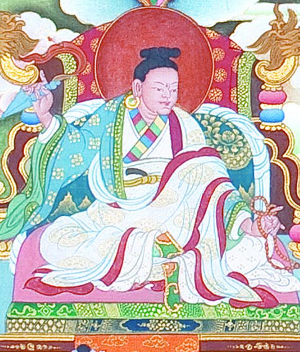Nyang Ral Nyima Özer: Difference between revisions
Jump to navigation
Jump to search
No edit summary |
No edit summary |
||
| Line 11: | Line 11: | ||
*[[Dudjom Rinpoche]], ''The Nyingma School of Tibetan Buddhism, Its Fundamentals and History'', trans. and ed. Gyurme Dorje (Boston: Wisdom, 1991), page 755-759. | *[[Dudjom Rinpoche]], ''The Nyingma School of Tibetan Buddhism, Its Fundamentals and History'', trans. and ed. Gyurme Dorje (Boston: Wisdom, 1991), page 755-759. | ||
*Daniel Hirshberg, ''Remembering the Lotus-Born: Padmasambhava in the History of Tibet’s Golden Age'' (Somerville, MA: Wisdom Publications, 2016). | *Daniel Hirshberg, ''Remembering the Lotus-Born: Padmasambhava in the History of Tibet’s Golden Age'' (Somerville, MA: Wisdom Publications, 2016). | ||
==Internal Links== | |||
*''[[Pointing-out Instruction to the Old Lady]]'' | |||
==External Links== | ==External Links== | ||
Latest revision as of 13:15, 15 May 2021

Nyang Ral Nyima Özer (Tib. ཉང་རལ་ཉི་མ་འོད་ཟེར་, Wyl. nyang ral nyi ma 'od zer) (1124/1136 - 1192/1204) was a mind emanation of King Trisong Detsen and the first of the Five Sovereign Tertöns. His termas contain cycles associated with the guru, yidam and dakini, but mostly the latter two, especially the cycle of the Kagyé Deshek Düpa and the dakini cycle of Tröma Nakmo (Wyl. khros ma nag mo). The guru cycle is called Lama Yongdzok (Tib. བླ་མ་ཡོངས་རྫོགས་, Wyl. bla ma yongs rdzogs).
His Writings
- ཆོས་འབྱུང་མེ་ཏོག་སྙིང་པོ་སྦྲང་རྩིའི་བཅུད་, chos 'byung me tog snying po sbrang rtsi'i bcud
- Zanglingma, a biography of Guru Rinpoche
Further Reading
- Dudjom Rinpoche, The Nyingma School of Tibetan Buddhism, Its Fundamentals and History, trans. and ed. Gyurme Dorje (Boston: Wisdom, 1991), page 755-759.
- Daniel Hirshberg, Remembering the Lotus-Born: Padmasambhava in the History of Tibet’s Golden Age (Somerville, MA: Wisdom Publications, 2016).
Internal Links
External Links
Gallery
-
The Phurba used by Nyang Ral Nyima Özer which was offered to Lama Gönpo Tseten Rinpoche by H.H. the Fourteenth Dalai Lama.
